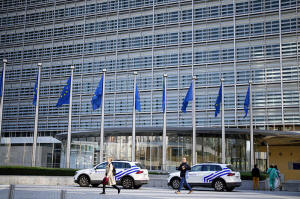|
Last week, ahead of Friday's surprise announcement, EU
Commission President Ursula von der Leyen and U.S. President
Donald Trump agreed to “accelerate talks” on a deal. “In the
event that our negotiations do not lead to a balanced outcome,
the EU is prepared to impose countermeasures, including in
response to this latest tariff increase,” European Commission
spokesperson Olof Gill told a press conference in Brussels.
He said the EU is finalizing an expanded list of countermeasures
that would automatically take effect on July 14 or earlier.
That’s the date when a 90-day pause, intended to ease
negotiations, ends in tariffs announced by the two economic
powerhouses on each other. About halfway through that grace
period, Trump announced a 50% tariffs on steel imports.
Trump’s return to the White House has come with an unrivaled
barrage of tariffs, with levies threatened, added and, often,
taken away. Top officials at the EU’s executive commission says
they’re pushing hard for a trade deal to avoid a 50% tariff on
imported goods.
Negotiations will continue on Wednesday in Paris in a meeting
between the EU’s top trade negotiator, Maroš Šefčovič, and his
counterpart, U.S. Trade Representative Jamieson Greer.
The EU could buy more liquefied natural gas and defense items
from the U.S., and lower duties on cars, but it isn't likely to
budge on calls to scrap the value added tax — which is akin to a
sales tax — or open up the EU to American beef.
The EU has offered the U.S. a “zero for zero” outcome in which
tariffs would be removed on both sides for industrial goods
including autos. Trump has dismissed that, but EU officials have
said it’s still on the table.
The announcement Friday of a staggering 50% levy on steel
imports stoked fear that big-ticket purchases from cars to
washing machines to houses could see major price increases. But
those metals are also so ubiquitous in packaging that they’re
likely to pack a punch across consumer products.
All contents © copyright 2025 Associated Press. All rights reserved

|
|




